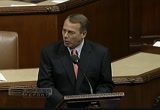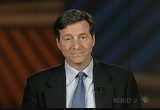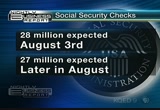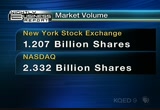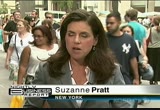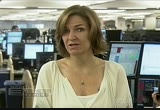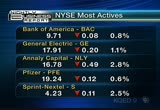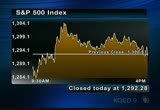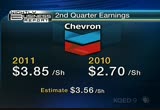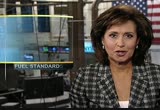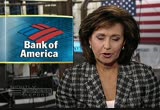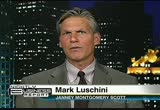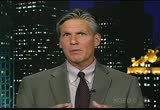tv Nightly Business Report PBS July 30, 2011 1:00am-1:30am PDT
1:00 am
1:01 am
this program is made possible by contributions to your pbs station from viewers like you. captioning sponsored by wpbt >> susie: good evening everyone. my colleague tom hudson is off tonight. lawmakers in the house of representatives are voting on a they just approved a plan to raise the nation's dollar rowing limits. they spent the day trying to find ways to avoid a government default on tuesday. it comes after president obama made an 11th hour appeal for both sides to compromise. at the white house this morning he says, quote, there are plenty of ways out of this mess but we're almost out of time. maneuvering on capitol hill the maneuvering on capitol hill comes as a new report shows economic growth has ground to a standstill, making the theater
1:02 am
in washington seem all the more absurd. but first, darren gersh has the latest from washington. >> reporter: house republicans have finally found the extra sweetener their hard-line members needed to swallow a debt limit increase. house speaker john boehner added to his debt-limit extension bill a provision requiring a balanced budget amendment pass congress before another vote can be held to raise the debt limit. >> this house has acted and it is time for the administration and time for our colleagues across the aisle, put something on the table! tell us where you are! senate democrats lashed out saying the house republican plan used the constitution as a bargaining chip by insisting on passage of a balanced budget amendment. >> they're not satisfied with a vote on it. they want a guarantee guaranteed-- guarantee that it is passed before they will allow an extension of the debt limit. i mean how bizarre can anyone be. >> reporter: in recent days the president had been keeping a low pro fail as the house struggled to pass
1:03 am
a plan. but today he encouraged americans to keep calling congress demanding action. >> if we don't come to an agreement we could lose our country's aaa credit rating. not because we didn't have the ca passit ot pay our bills, we do. but because we didn't have a aaa political system to match. our aaa credit rating. >> the slowing economy also makes maintaining that harder. sluggish growth could add $100 billion to the deficit this year. far outstripping the immediate deficit reduction that's been delivered by congress so far. slower growth also means the next few years can could see lower tax revenues and higher spending for social security and much more. >> on top of it there is unemployment compensation, on top of that, you have snap or food stamps, on top of that you have people who become eligible for medicaid who we anticipate it would not be, it would be covered by private insurance. or what those costs add on the spending side of the
1:04 am
ledger in addition to the reduced revenues on the other side. >> reporter: now, susie, of course if we do default or go and have our credit downgraded, that's going to increase interest rate costs which will also have to be added to the deficit making the problem harder. >> susie: well, let's talk about this bill that just passed, house speaker john boehner's bill, what is the next step now in this process? >> it's going to be 72 hours of a c-span marathon. in fact, probably you might be able to see a senate cloture vote at 1 a.m. sunday morning. so there's a lot of sausage-making to happen. but in a nutshell, i mean the basic thing is the senate's going to try to come up with some kind of bipartisan agreement. it's going to send it back over to the house. the president is being to have to get involved. and then we're going to see whether enough democrats and republicans in the house can come together to pass something in time for us to avoid a train wreck on tuesday. >> susie: what are the odds it in terms of this sauceage
1:05 am
making it that out of all this weekend negotiation that we do get an agreement to raise the debt ceiling by the tuesday deadline. >> reporter: i'm sorry to say at best they're even money. it's not entirely clear right now with just a couple of days to go how this gets through the house, how it gets enough bipartisan support. and one person who is very familiar with republican politics is saying it could be one in four and that the only things that's going to get this done is some kind of market upheaval that really gets members of congress scared. >> susie: well, the other thing that is scaring a lot of people and a lot of investors is what are the odds that u.s. debt gets a downgrade. now late today moody's investment service, one of the ratings agencies said that the u.s. is likely to keep its aaa rating. but they may shift to a negative outlook. like what would that mean if that happened? >> the negative outlook is probably realistic because you, you know, they're going to be concerned about whether after what we've watched that the political
1:06 am
process can come together and deliver deficit reduction. but the idea of an immediate downgrade always struck me and some of the people i've spoke to as a little premature. because in both of these bills that we see in the house and senate, there's going to be this committee that comes together and proposes pore deficit reduction in six months. i don't know how a credit rating agency could come out and downgrade the united states unless we default and we miss the tuesday deadline spectacularly, could downgrade the united states when it's clear that in the next six months, all the system is going to be trying to do, all everybody is going it to be to be focused on here is delivering more deficit reductions. so if we make it through tuesday, i think the odds of a downgrade will be difficult for a ratings agency to come in and downgrade the united states when the congress can say wait a minute, we've got a process in place, in six months, to deliver a lot more deficit reductions. >> susie: it all depends what happens between now and tuesday. all of these there are a lot
1:07 am
of ifs here, we'll check with you on monday. >> i'm sure will you. >> have a great weekend. and we've been speaking with darren gersh, washington bureau chief. >> well, the risk of a u.s. default is also a big worry for many older americans. they're conditioned about their monthly social security payments. now we placed several unanswered calls expecting social security checks on august 3. an additional 27 million beneficiaries expect payments later in the month. we caught up with a couple of them to see what's on their minds. >> it's a scare tactic. i mean because there's so many other things that they can stop before they stop social security checks. >> whether it is the republicans or democrats win this game, you have to remember next year is an election year again. so they're posturing themselves. and they're playing a game that is kind of tough. but again they have to get
1:08 am
something passed sooner or later. >> susie: so far, the treasury has not provided details on how the government will decide which bills to pay if the borrowing limit is not raised. executives from the country's biggest banks met today with treasury officials in new york ahead of tuesday's deadline. they discussed how debt auctions would be handled if congress fails to raise the borrowing limit before then. here on wall street, the word of the day? anxious. the dow fell almost 97 points, the nasdaq lost almost 10 points, and the s&p 500 was down eight. as for volume, the heaviest this week for the big board with 1.2 billion shares trading. the nasdaq traded 2.3 billion shares. it was the worst week for stocks in over a year. the dow took the biggest hit, falling every session this week for a net weekly loss of 537 points or 4.2%. the nasdaq managed to close up one day this week, still it lost 102 points on the week or over 3.5%. the s&p lost ground in all five sessions this week for a net
1:09 am
loss of 52 points or 3.9%. >> reporter: i'm diane eastabrook in chicago. still ahead, the government is raising vehicle fuel economy standards, but the question is, will automakers be able to meet those higher standards by the year 2025? >> susie: now to today's other top story. the u.s. economy stumbled badly in the second quarter, raising the risk of another recession. the nation's g.d.p. expanded at an anemic annual rate of 1.3% in the april through june period, much slower than expected. and as suzanne pratt reports, experts are now concerned about the recovery in the final months of this year. >> reporter: stuck in the mud. a snail's pace. or how about flat-lining? all are perfect metaphors for the state of the economy. it's bad enough that g.d.p.
1:10 am
limped to annual rate of 1.3% in the second quarter, but today the government revised its previous first-quarter estimate down to a paltry 0.4%. on top of that, the government said today the great recession was even worse than originally thought. economist milton ezrati calls it a depressing snapshot. >> well, it was disappointing and i'm sure that these numbers are going to renew talk about a double dip and they're going to renew talk about a qe3 from the fed. >> reporter: here on new york's busy 5th avenue, it may be hard to imagine the economy is treading water. not only are the streets buzzing with tourists, but stores are brimming with shoppers. still, on main streets across the country, it's been nervous consumers that are holding the economy back. economist julia coronado blamed the lack of supply from japan due to the earthquake, as well as higher food and gas prices in the u.s. >> we also saw weakness in retail spending and spending on other services, because
1:11 am
consumers have been hit by very high inflation in the first half of the year and it really took its toll and consumer spending essentially ground to a halt. >> reporter: so what does the latest snapshot of economic growth mean for the next six months? many economists predict we'll get a modest acceleration in growth. >> we should have some catch-up in the third quarter. the u.s. economy is extremely sluggish, best we can look for is 2.5% to 3% growth, and that's awfully slow for a cyclical recovery. >> i do have a reasonably decent 3% growth forecast for the second half of the year, as auto sales rebound and as businesses rebuild inventories. of course, the big risk for the economy now is continued wrangling in washington over the nation's debt. the longer that drags on, the bigger the threat to confidence and spending. suzanne pratt, "nightly business report," new york. >> susie: meanwhile, concerns about the debt crisis combined with stagnant wages and rising unemployment are making consumers nervous.
1:12 am
the thomson reuters/university of michigan final july consumer sentiment index fell to 63.7 in july. it's the lowest level since march 2009. the sentiment reading, which covers how consumers view their personal finances as well as business and buying conditions, averaged about 87 in the year before the start of the most recent recession. >> susie: as we mentioned, wall
1:13 am
street wrapping up its worst weekly performance in a year with worries about those debt negotiations, and that weak report on economic growth didn't help either. let's take a look with tonight's "market focus." volatility was the way of the day. here's how the day played out on the s&p 500. you can see heavy selling in the morning on those washington worries, a slight comeback around midday on hopes of a debt deal and a return to selling in the afternoon. that made for little green in the dow 30. i.b.m. was the only dow stock moving higher. at&t unchanged. the rest of the components traded lower, with hewlett- packard taking the biggest hit-- down almost 3%. merck was the dow's second-worst performer. it reported second-quarter results in line with estimates, but investors dumped the stock on word that the drug giant plans big job cuts.
1:14 am
here are the earnings. 95 cents a share, up sharply from last year when it took a big restructuring charge. but the stock fell 2% after merck announced cutting 10% to 12% of its workforce by 2015, that's as many as 13,000 jobs. chevron another dow stock also in the red today, even though it reported quarterly profits up 43%. chevron earned $3.85 per share, almost 30 cents above analyst expectations. it benefited from higher oil prices and improved refining margins. still, the stock getting caught in today's down draft-- chevron shares falling $1. speaking of oil, crude prices taking a hit on u.s. debt worries. light sweet crude for september delivery down almost 2% to $95.70 a barrel. while some poured out of oil, many investors looked to gold for safety. the precious metal rising almost $15 today to a record high $1628.30 per ounce.
1:15 am
yahoo resolving a dispute with one of its biggest partners, alibaba group-- the chinese web portal. they've been fighting over ownership of the chinese firm's e-payment business ali-pay. they've now agreed to spin that business off. yahoo shares have been under pressure. the stock fell 40 cents today. it's now down over 24% from its may 9 high. it was a big week for initial public offerings. here's an update on what they returned to investors. the biggest, dunkin brands, debuted wednesday on the nasdaq. it's up over 52% from its $19 i.p.o. price. teavanna gained 66% this week. chef's warehouse up 18% since the i.p.o., but biopharma company horizon pharmaceutical unchanged from its i.p.o. price of $9 per share. and that's tonight's "market focus."
1:16 am
president obama took a break from the debt ceiling drama today to announce an historic agreement on new fuel efficiency standards. the deal will double overall fuel economy to 54.5 miles per gallon by 2025. that could mean filling up your gas tank every two weeks, instead of every week. diane eastabrook looks at some new technologies that could mean an even cleaner and more fuel- efficient ride down the road. >> reporter: if you check out
1:17 am
the fuel economy of new cars and trucks, you might wonder if auto makers will be able to increase corporate average fuel economy to nearly 55 miles per gallon by the middle of the next decade. scientists at argonne national laboratory near chicago think they will. at the lab's center for transportation research, engineer mike duobo uses a device that measures power to test fuel efficiency on some of the latest powertrains. >> it provides a lot of the data for people who are working on the next generation battery and the next generation engine. >> this is a volkswagen jetta imported from europe. it's only sold in europe. >> reporter: duobo thinks the technology on this v.w. will come to the u.s. in a few years. it marries a smaller, more fuel- efficient engine with a turbo charger. >> we had really high fuel economy cars in the '80s, but they accelerated from 0 to 60 in like 20 seconds. so, you know, having a turbo charger makes this smaller engine have enough torque, enough power, to drive comfortably and meet the expectations of the modern driver. direct fuel-injected engines like this one could become the industry standard.
1:18 am
center director don hillebrand says the engines are currently on a few u.s. models and offer about 25% better fuel economy than conventional ones. >> you have injectors directly over the combustion chambers, and they direct and they inject exactly the precise amount of fuel into the combustion chambers for each cycle. and so you have control of micro particles of gasoline over micro seconds. you know exactly what goes in. you can control exactly how it burns. and, you know exactly what comes out after the combustion happens. >> reporter: hillebrand thinks electric vehicles and hybrids will also become more mainstream. auto companies are also likely to use lighter materials and improve aerodynamics, which will also save on fuel. argonne researchers say these new technologies will be expensive, but they could save consumers a lot of money at the fuel pump. diane eastabrook, "nightly business report," lemont, illinois. >> susie: here's what we're watching for next week: our friday "market monitor" guest is adam parker, chief u.s. equity strategist at morgan
1:19 am
stanley. and we'll get the latest snapshot on jobs from the july employment report. monday, deal or no deal? with one day until the debt ceiling deadline, all eyes will be on the u.s. capitol and wall street. we'll bring you the latest developments. >> susie: bank of america faces a new lawsuit, this one is from institutional investors claiming they were misled by countrywide financial. that group of investors includes blackrock, calpers and t. rowe price. they're asking for unspecified damages and class-action status. the suit, filed in federal court in los angeles, is a setback for bank of america, which has tried to put the subprime mess behind it by settling a number of claims. no comment from b. of a. on the lawsuit. public school teachers in detroit will take a 10% pay cut and pay more for their health care starting today in order to address the city's financial emergency. the measures are designed to
1:20 am
1:21 am
of good stock opportunities for investors. joining us now, mark luschini, chief investment strategist at janney montgomery scott. hi, mark, nice to see you. >> hi, susie. good to see you. >> susie: all right, so you heard all of our conversation about is there going to be a debt deal over the weekend, is there going to be a defall on tuesday. what do you think will happen in the markets on monday? >> i think more of what we've seen this week, which is to say the equity markets will continue to slip as long as the uncertainty surrounding the resolution of this debt ceiling issue is found. particularly as we're much closer than we were just today or even an hour ago to having to see either a downgrade to our credit rating and or an increasing risk of a default. >> are there any sectors more vulnerable than others. >> i would think one would have to be careful, first of all any exposure to risk assets that are going to be covered to a higher degree of volatility than higher quality position. that would be things like emerging markets or small
1:22 am
company stock or highly speculative issues. in addition to that, we have seen of course even in the fixed income market spreads widen between treasuries and other lower credit rated quality fixed income instruments. so i think you'll expect to see some turbulence across the entirety of the capital markets to varying degrees until we have something by our bickering congress. >> you say even though there is a lot of volatility in the next couple of days there are still good quality stocks out there. let's take a look at your list. at the top you have wal-mart. tell us why you like wmt? >> well, a terrific franchise, biggest retailer in the united states, and a growing franchise tapping into the fast-growing areas in emerging markets like mexico and particularly of recent taking a majority stake in an african-based retailer which is a bunchonning continent with a large population and rising middle class. the company's trading at a valuation of 10, 11 times forward earnings.
1:23 am
has a fortress balance sheet and even though it is struggling domestically with regard to same store sales activity we think this company will get it right. in the meantime you get a 2.7% dividend so you get paid to wait. >> susie: tell us about microsoft. why do you like it, trading at 27 dollars, pretty of the same place it was trading in january. >> a bit of the same theme there with regard to wal-mart. microsoft is one of the four aaa rated companies in the united states. again, 50 billion dollars in cash, almost a 3% dividend yield. a company that is experiencing terrific revenue growth and the market is basically unrecognizing it. kind of the rodney dangerfield of technology companies at the moment, getting no respect. >> tell us about conoco philips it reported some disappointing earnings earlier in the week. the stock has been taking a hit why dow like cop? >> well, it's an interesting franchise. one is a sector we like. we think global energy demand will continue to increase in the coming years particularly being drawn if
1:24 am
emerging markets. conoco philips is one of the largest major integrated oil companies. it's actually announced it will be divesting itself into an exploration and production company along with a refining business. it's been attempting to monetize assets over the last couple of years, that it acquired that had give ten a high debt burden it will become more profitable and pays over 3.5% dividend yield. >> let's wrap up by talking about gold. we reported earlier that gold prices hit a new record high. you're saying that gold is still a good place to be and recommended the gld. can investors still make money with gold at this high price? >> we think so. we're still long gold. we've been long gold for a 23478 of years at this junk ture but the point that we believe will continue to put a bid under gold prices and ultimately lead it to a mania candidate status which at this juncture we don't believe it's yet found was the fact that we will continue to deal way high level of fiscal and financial uncertainty even as the august 2nd date
1:25 am
passes and hopefully we have a resolution to this debt ceiling issue. >> real quickly so the theme of your investments is big global companies, good dividend yield and cheap prices, huh? >> that's a common theme. and there's plenty around besides the three i mentioned. >> susie: any disclosures to make, mark? >> we own all in our client's portfolio with the exception of wal-mart. >> susie: thanks so much for coming on the program. hope you have a great weekend. >> thank you, susie. mark luschini, chief investment strategist at janney montgomery scott. and finally, what's blue, in 3d and showed up today here at the big board? the smurfs! papa smurf, smurfette and clumsy smurf rang the opening bell here this morning. their movie, "the smurfs in 3d," opens today. the big-screen version of the classic cartoon mixes live- action characters with the blue animated creatures.
1:26 am
that's "nightly business report" for friday, july 28. i'm susie gharib. have a great weekend. we hope to see all of you again next week. "nightly business report" is made possible by: this program was made possible by contributions to your pbs station from viewers like you. captioning sponsored by wpbt captioned by media access group at wgbh access.wgbh.org >> be more.
142 Views
IN COLLECTIONS
KQED (PBS) Television Archive
Television Archive  Television Archive News Search Service
Television Archive News Search Service 
Uploaded by TV Archive on

 Live Music Archive
Live Music Archive Librivox Free Audio
Librivox Free Audio Metropolitan Museum
Metropolitan Museum Cleveland Museum of Art
Cleveland Museum of Art Internet Arcade
Internet Arcade Console Living Room
Console Living Room Open Library
Open Library American Libraries
American Libraries TV News
TV News Understanding 9/11
Understanding 9/11

